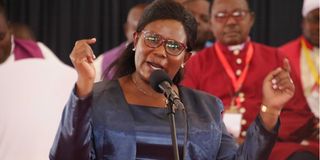Importance of timing for political actions

Meru Governor Kawira Mwangaza when she addressed a prayer gathering attended by President William Ruto in Embu on December 4, 2022.
Ecclesiastes 3: 1-11 ( Bible) : "There is a time for everything and a season for every action under the heavens. A time to be born, and a time to die; a time to plant and a time to uproot; a time to tear down and a time to build; a time to mourn and a time to dance ; a time to scatter stones and a time to gather them ; a time to love and a time to hate; a time to embrace and a time to refrain..."
Sub judice rule does not apply in parliamentary practice, unlike in the Judiciary. The sub judice rule is basically a gag against discussing merits and demerits of active cases outside court.
The opposite is in fact true on parliamentary matters. The public should actively discuss matters pending before Parliament, this being a political institution requiring active public oversight.
However, this article gags itself from discussing merits and demerits of the impeachment of Meru Governor Kawira Mwangaza so as to allow independent evaluation of the assembly evidence by the Senate.
However, that impeachment raises an important secondary issue — the essence of timing in politics.
Is the timing of her impeachment strategic, even ignoring her rights or misdeeds?
Would one single and similar political action matter if done on different days?
For example, would resigning from the public office of a Cabinet secretary at 10am have a similar effect if the same act is done at 4pm the same day?
Should a defection from a political party be announced on Friday or Sunday?
An analysis of various historical political timings could provide an answer.
Martha Karua was a top Kibaki government minister from 2002 to 2007. During the post-2007 electoral violence negotiations, she got fame in Mt Kenya when she defended President Mwai Kibaki win vigorously.
However, she resigned in 2009, after the Grand Coalition Government was formed. She has never recovered politically. Would she have fared better if she resigned late, say a few months before the 2013 elections?
Compare her with Kibaki. He was President Daniel Moi's vice-president for a long time. Moi then commenced actions to undercut him.
He chose to bid his time and ignored pressure to resign in 1989 when the fight for multiparty democracy was at its peak.
He resigned a few months before the 1992 elections and became a major political player when he garnered a substantial voting bloc.
Maybe if he had resigned earlier in 1989 as he was being pressured by his peer Kenneth Matiba,he might have missed the presidency.
In 1997, William Ruto was already a presidential candidate, but he stepped down for Raila Odinga, and for Uhuru Kenyatta in 2013 and 2017 respectively. This timing proved correct when momentum for his 2022 win was created.
Wainaina Jungle was the celebrated MP for Thika. He commenced his Kiambu gubernatorial bid four years ago through subtle campaigns. He went full throttle when UDA was being formed in 2021. Moses Kuria was also seeking the Kiambu seat.
Senator Kimani Wamatangi was on the sidelines, keeping his cards close to his chest whilst leaning Jubilee. He sprang a surprise last-minute defection to UDA and won the seat.
Purity Ngirichi created UDA structures in Kirinyaga, while eyeing the gubernatorial seat. Governor Anne Waiguru was a Jubilee kingpin, but defected to UDA a few months to the elections, causing Ngirichi to bolt and abandon almost five years of political investment. Waiguru won a second term.
Could circumstances and outcomes have been different if,say Waiguru or Wamatangi had defected earlier?
When Nairobi Governor Mike Sonko was impeached, it followed a by-election was to be held, as a matter of law. With Raila supporting Jubilee and Nairobi being his stronghold, it was expected a Raila-Uhuru candidate would win. But a week before the impeachment, UDA won a Coast by-election. Fearing a “bandwagon effect”, government strategists cancelled plans for the by-election on the basis of wrong timing.
All these cases affirm one point. The importance of correct timing for political actions.
This then raises the question, is the Meru impeachment correctly timed, taking into account the governor has just been elected into office?
No one can tell.
Maybe St Augustine was right when he said, “What then is time? If nobody asks me, I know what it is. If I wish to explain it to him who asks, I do not know.”
Dr Kang’ata is the Governor of Murang’a County.





